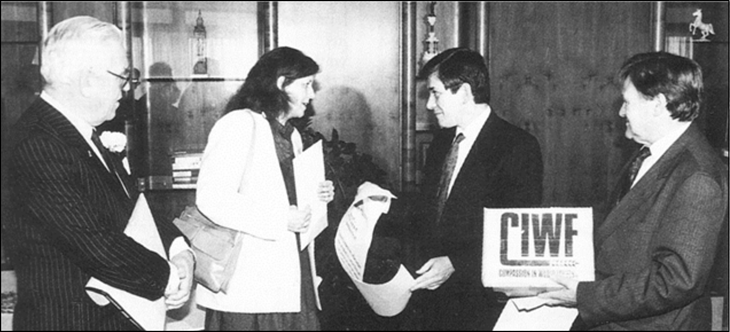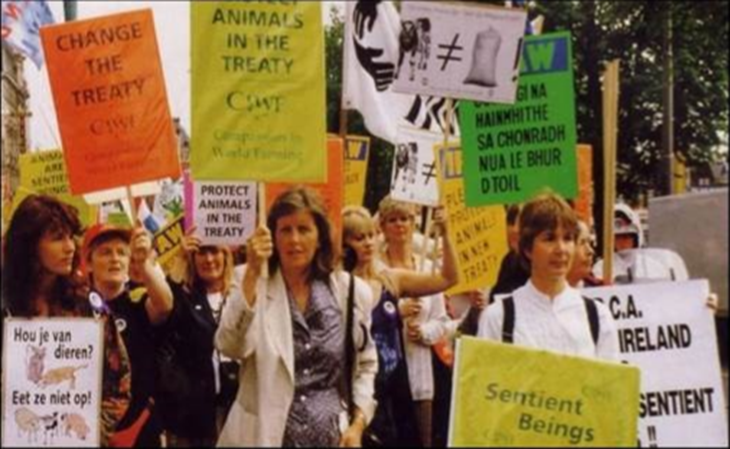Published 08/04/2020
Guest blog by Joyce D’Silva
Way back in 1988, Compassion in World Farming began a campaign to get the European Union to recognise that animals are sentient beings, i.e. that they are capable of feeling joy and pain like we do. At that time the EU Treaty referred to animals only as “goods” or “products”, like sacks of wheat or potatoes.
We at Compassion in World Farming enlisted the help of our sister EU-based animal NGOs in the (then) 15 member states of the EU to achieve a million-signature petition. The groups translated our petition and took it out on the streets and on their information stalls. This was before the time of online petitions and social media!
Amazingly, within 3 years, together with our EU friends we had collected these signatures. This was the first ever EU petition to reach over a million signatures.
At our headquarters in the UK, the petitions were packed into cardboard boxes and two members of staff drove them to Strasbourg where the European Parliament was meeting that month.
At the time, as the CEO of Compassion in World Farming I had the privilege to hand a box of the petitions to the President of the Parliament. Then the entire collection was handed to the Petitions Committee.

It took 3 years, until 1994, for the Committee to endorse the petition, but they did, and it was then endorsed by the Parliament.
In the UK, Compassion in World Farming continued to lobby the government. It took a while to drum up support but eventually in May 1997, it happened as the new Labour deputy Agriculture Minister, Elliot Morley MP, was highly sympathetic on animal welfare.
Just 6 weeks after he took office, the 15 EU Prime Ministers were meeting in Amsterdam to conclude a new updated version of the European Treaty, the Treaty of Amsterdam. Mr Morley managed to get the UK Prime Minister, Tony Blair, to include Compassion’s request in the proposed Treaty.
Compassion held a march in Amsterdam with friends from all over the EU, who had helped with the petition. As they drove to their meeting, the Prime Ministers saw (and heard!) the demonstrators with their sentience placards in many languages.

A legally binding Protocol, recognising animals as sentient beings, was added to the Treaty of Amsterdam. When the Treaty of Lisbon was agreed in 2008, the Protocol was upgraded to an Article within the Treaty.
It is now Article 13 of the Treaty on the Functioning of the European Union:
In formulating and implementing the Union's agriculture, fisheries, transport, internal market, research and technological development and space policies, the Union and the Member States shall, since animals are sentient beings, pay full regard to the welfare requirements of animals, while respecting the legislative or administrative provisions and customs of the Member States relating in particular to religious rites, cultural traditions and regional heritage.
Not only does this recognise animals as sentient beings, but it calls on the Union itself and Member States, to “pay full regard” to the welfare of animals in agriculture, transport, fisheries etc.
This big win helped animal welfare campaigners to secure major improvements in EU law, such as a ban of barren battery cages for hens, the end to near-permanent confinement of sows and the partial ban of the horrifically restrictive veal crate.
It is incumbent upon Europe’s policymakers to entrench the recognition that animals are sentient beings in more rigorous enforcement of current animal protection legislation, and to strengthen future provisions for the protection and welfare of animals.
Joyce D’Silva is our former CEO and currently our Ambassador Emeritus